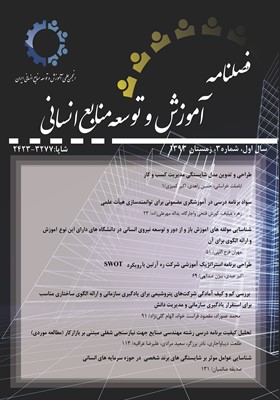سواد برنامه درسی در آموزشگری مضمونی برای توانمندسازی هیأت علمی
محورهای موضوعی :زهره عباباف 1 , یداله مهرعلیزاده 2
1 -
2 -
کلید واژه: آموزشگری برنامه درسی آموزش عالی توسعه منابع انسانی دانش عملی سواد برنامه درسی مولفههای حرفه ای,
چکیده مقاله :
مقاله حاضر، مولفههای حرفهای مبتنی بر دانش عملی برنامه درسی برای مدرسی/آموزشگری در محیط آموزش عالی از نگاه مدرسان حوزه مطالعات برنامهدرسی را مورد کاوش و توصیف قرار داده است. دادههای مورد مطالعه بر اساس پژوهش کیفی اکتشافی و از طریق انجام مصاحبه نیمه ساختارمند با 12 مدرس حوزه مطالعات برنامه درسی انجام یافته است. یافتهها نشان دادند که مدرسان مورد مصاحبه نگاه یکسانی نسبت به قلمرو برنامه درسی در آموزشگری نداشته اند. یافتهها در سه طبقه: نگاه تخصص محور، نگاه مشارکت محور و نگاه مدرس محور تفکیک شدند. مولفههای اصلی دانش عملی برنامه درسی در سه نگاه مشتمل بر دو مولفه اصلی: آمادگی برای عمل و اقدام برای عمل برنامه درسی بوده است. اما حدود و ثغور مولفههای حرفهای مربوط به هر کدام از مولفههای اصلی در سه نگاه یکسان نبوده است. در نگاه تخصص محور، مولفههای حرفهای عمل برنامه درسی: فعلیت بخشیدن به طراحی آموزشی، ارتباط برقرار کردن و تأمل بعد از عمل را شامل شده است. در نگاه مشارکت محور، مولفههای حرفهای عمل برنامه درسی: فعلیت بخشیدن به برنامه درسی، ارتباط برقرار کردن و تأمل بعد از عمل را در برگرفته است. در نگاه مدرس محور، مولفههای حرفهای عمل برنامه درسی شامل: فعلیت بخشیدن به برنامه درسی، ارتباط برقرار کردن، تجسم، تأمل حین عمل و تأمل بعد از عمل بوده اس.
The current paper studies and explains the professional components based on curriculum literacy of educators in higher education with the viewpoints of professors on curriculum studies. Qualitative research method was used in this study, and the depth semi-structured interviews with 12 professors of curriculum studies were conducted. Results about perspective of curriculum include three categories: specialist-centered, participation-centered, and teacher-centered. Each of them includes knowledge and practice of the curriculum. In the three perspectives, the practical knowledge for curriculum consists of two main components: preparation for performance of the curriculum and action for performance of the curriculum. But the limits of the professional components of each of the main components in all three perspectives are not the same. In the components of specialist-center curriculum, include as follows: to actualize the educational design to reflect and operate after practice. The components of participation-centered curriculum consist as follows: to actualize the curriculum, to communicate and reflect after practice. The components of teacher-centered curriculum are as follows: to actualize the curriculum, to communicate, to imagine and reflect during and after practice


